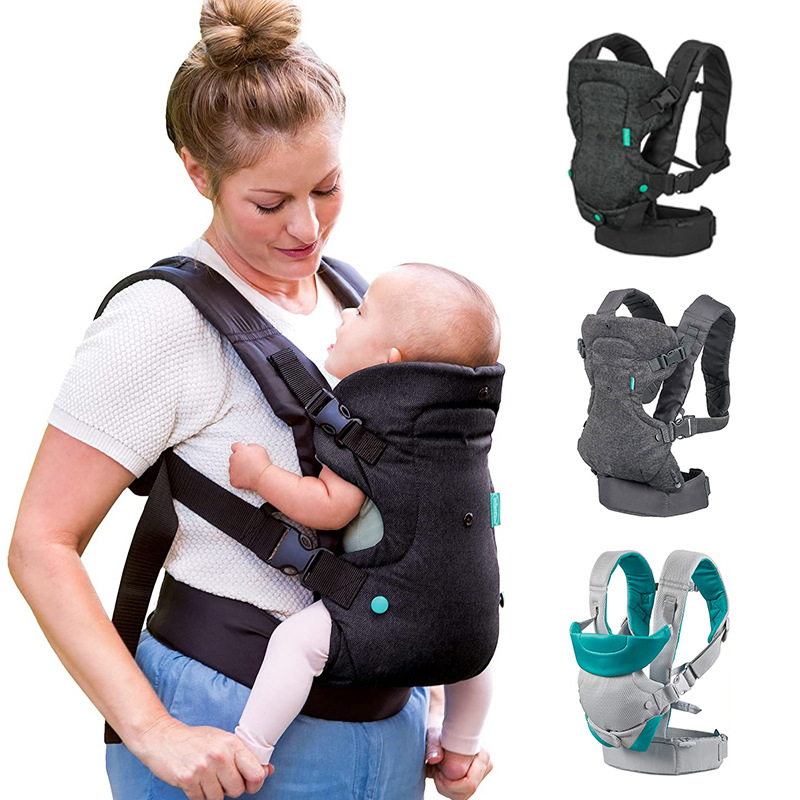Choosing the right baby carrier can be a game-changer for new parents. It’s not just about convenience; it’s about ensuring both you and your baby are comfortable and secure. With numerous options on the market, finding the perfect baby carrier may seem overwhelming. This guide will help you navigate through the different types of carriers and factors to consider, so you can make an informed decision that suits your family’s needs.

Understanding the Different Types of Baby Carriers
- Wrap Carriers
Wrap carriers are long pieces of fabric that you wrap around your body and secure to hold your baby close. They offer excellent flexibility and can be adjusted to fit different body types and baby sizes. They are ideal for newborns and provide a snug, customizable fit. However, they can be tricky to master initially and may require practice to get the wrapping technique just right. - Ring Slings
Ring slings are similar to wrap carriers but come with rings that allow you to adjust the fit. They are easier to put on and take off compared to wrap carriers and are great for quick adjustments and breastfeeding. However, they can sometimes cause shoulder strain if not adjusted properly. - Soft Structured Carriers (SSC)
Soft structured carriers come with padded straps and a structured waistband for added support. They are easy to use, offer good weight distribution, and are suitable for a range of ages and sizes. Most SSCs are adjustable and can be used for front, hip, or back carrying positions. They are a popular choice for parents looking for convenience and comfort. - Mei Tai Carriers
Mei Tai carriers combine elements of both wraps and structured carriers. They feature a panel for the baby and four straps for securing the carrier. Mei Tai carriers offer versatility and can be used for different carrying positions. They are often appreciated for their simplicity and support. - Carrier Backpacks
Carrier backpacks are designed for older babies and toddlers. They come with a sturdy frame and are ideal for long hikes or extended outings. These carriers provide excellent support for both the parent and the child and usually have additional storage space for carrying essentials.
Key Factors to Consider When Choosing a Baby Carrier
- Comfort for Both Parent and Baby
The most important factor is comfort. Look for a carrier with padded shoulder straps and a supportive waistband to ensure even weight distribution. The carrier should also offer good head and neck support for your baby, especially if they are a newborn. - Ease of Use
Consider how easy it is to put on and take off the carrier. Some carriers are designed for quick adjustments, while others might require more time and practice. Soft structured carriers and ring slings are generally easier for beginners compared to wraps. - Adjustability
A carrier that grows with your baby is a valuable investment. Look for adjustable features that can accommodate your baby’s changing size and weight. Some carriers come with adjustable straps, panels, and seats to ensure a secure fit for both infants and toddlers. - Breathability and Fabric
The material of the carrier affects both your and your baby’s comfort. Breathable fabrics like cotton or mesh are ideal for warmer climates as they help prevent overheating. Ensure that the fabric is soft and gentle against your baby’s skin to avoid irritation. - Safety Features
Safety is paramount when choosing a baby carrier. Check for safety certifications and ensure that the carrier meets standard safety guidelines. Features such as secure buckles, sturdy stitching, and appropriate weight limits are essential for a safe carrying experience. - Carrying Positions
Different carriers offer different carrying positions, such as front, hip, and back carries. Consider which positions you prefer and which will be most practical for your daily activities. For example, back carries are great for older babies and toddlers, while front carries are ideal for newborns. - Lifestyle and Activities
Think about your lifestyle and how the carrier will fit into your daily routine. If you’re active and enjoy hiking, a carrier backpack with extra support might be best. For urban parents, a soft structured carrier or a ring sling might offer more convenience. - Budget
Baby carriers come in a wide range of prices. Determine your budget and look for carriers that offer the best features within that range. While higher-priced carriers often come with additional features and better materials, there are many affordable options that provide excellent value.
Testing and Trying
Whenever possible, try out a carrier before purchasing. Many baby stores offer the option to test different carriers. You can also consider borrowing a carrier from a friend or joining a baby-wearing group to get a feel for different options. Pay attention to how the carrier feels when worn for extended periods and how it accommodates your baby’s needs.
Conclusion
Choosing the right baby carrier involves balancing comfort, convenience, and safety. By understanding the different types of carriers and considering key factors such as adjustability, ease of use, and material, you can find a carrier that meets both your and your baby’s needs. Whether you opt for a wrap, ring sling, soft structured carrier, or carrier backpack, the right carrier will make your parenting journey more enjoyable and manageable. Take the time to research and test carriers, and you’ll be well on your way to finding the perfect fit for your family.